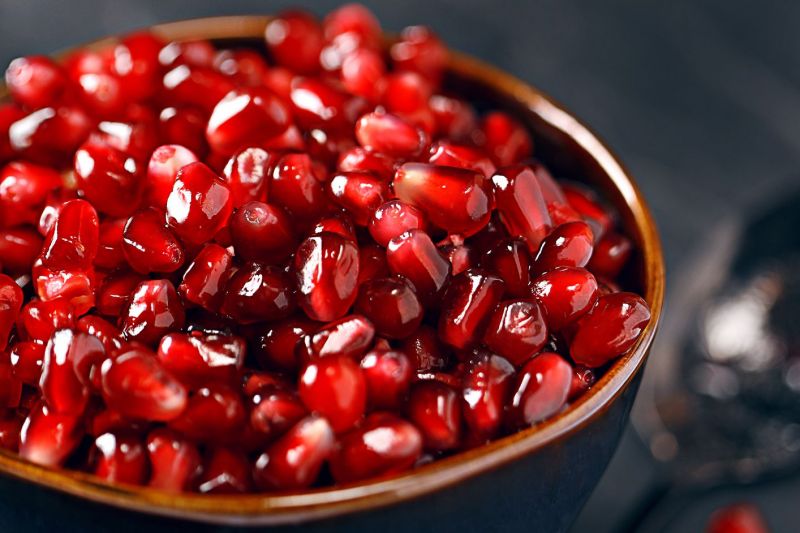
Pomegranates, with their vibrant ruby-red seeds encased in a tough, leathery skin, have been revered for their medicinal properties and exquisite taste for centuries. Beyond their delicious flavor and aesthetic appeal, pomegranates are packed with a plethora of health benefits that make them a prized fruit in traditional medicine and modern nutritional science.
Loaded with Nutrients: These unique fruits are a rich source of essential nutrients. Pomegranate seeds (known as arils) are bursting with vitamins, particularly vitamin C, which plays a crucial role in boosting the immune system and collagen production. Additionally, they contain vitamin K, essential for bone health, and folate, vital for cell division and DNA synthesis.
Potent Antioxidants:
Pomegranates are brimming with powerful antioxidants, notably punicalagins and anthocyanins, which contribute to their vibrant hue. These antioxidants combat free radicals in the body, reducing oxidative stress and lowering the risk of chronic diseases like heart disease and certain cancers.
Heart Health Champion:
Numerous studies highlight the heart-healthy properties of pomegranates. The fruit has shown promise in lowering blood pressure levels, reducing LDL (bad) cholesterol oxidation, and improving overall cardiovascular health. Regular consumption may decrease the risk of heart disease by improving blood flow and preventing plaque buildup in arteries.
Anti-Inflammatory Properties:
Chronic inflammation is linked to various health issues, including arthritis and certain types of cancer. Pomegranates possess potent anti-inflammatory properties that may help alleviate symptoms associated with inflammation, providing relief to individuals suffering from inflammatory conditions.
Supports Digestive Health:
Pomegranates contain dietary fiber, aiding digestion and promoting a healthy gut. The fiber content helps prevent constipation and promotes regular bowel movements, while also supporting the growth of beneficial gut bacteria, contributing to overall digestive well-being.
Potential Cancer-Fighting Abilities:
Some research suggests that the compounds found in pomegranates could inhibit the growth of cancer cells, particularly in cases of breast and prostate cancers. However, further studies are necessary to fully understand the fruit's role in cancer prevention and treatment.
Boosts Exercise Performance and Recovery:
Drinking pomegranate juice has been linked to improved exercise performance due to its ability to enhance blood flow and oxygenation of muscles. Its high antioxidant content may also aid in reducing muscle soreness and hastening post-exercise recovery.
How to Incorporate Pomegranates Into Your Diet:
There are numerous ways to enjoy pomegranates beyond simply eating the seeds as they are. You can:
Add arils to salads, yogurt, or oatmeal for a burst of flavor and nutrients.
Make a refreshing juice or smoothie by blending the seeds with water or other fruits.
Use pomegranate molasses as a tangy and sweet addition to dressings, marinades, or sauces.
Enjoy the seeds on their own as a healthy snack.
Pomegranates are not just delicious; they are a nutritional powerhouse. Their impressive array of vitamins, antioxidants, and potential health benefits make them a valuable addition to a balanced diet. Whether eaten raw, juiced, or used as a flavor enhancer in various dishes, incorporating pomegranates into your diet can significantly contribute to your overall health and well-being.